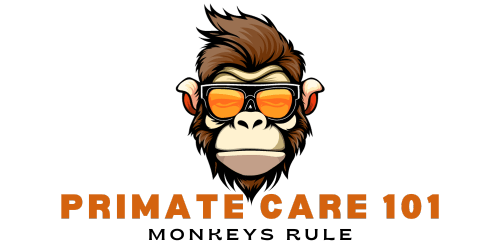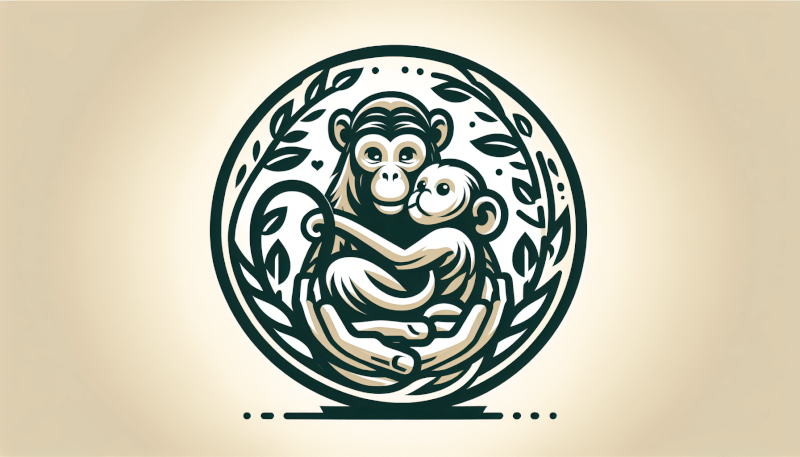Have you ever wondered how long pet monkeys typically live? Whether you already have a furry primate friend or you’re considering adopting one, understanding their lifespan is essential for providing proper care and companionship. In this article, we will explore the average lifespan of pet monkeys, shedding light on the factors that influence their longevity and offering valuable insights into ensuring a happy and healthy life for your beloved simian companion. So, grab a banana and let’s explore the fascinating world of pet monkey lifespans together! Pet monkeys, like any other animal, have varying lifespans that are influenced by a range of factors. Understanding these factors is essential for ensuring the health and longevity of these incredible creatures. In this article, we will explore the different factors that can affect the lifespan of pet monkeys, including their species, genetics, environment, nutrition, and veterinary care.
Species of Pet Monkeys and Their Lifespan
Different species of pet monkeys have different lifespans. Marmosets, for example, have an average lifespan of 15 to 20 years, while capuchins can live up to 40 years. Squirrel monkeys have a lifespan of about 25 years, tamarins can live for 15 to 20 years, and spider monkeys have a lifespan of around 25 to 30 years. Guenons, macaques, baboons, gibbons, and chimpanzees each have their own specific lifespans as well.
Genetics and Lifespan in Pet Monkeys
Genetics play a significant role in determining the lifespan of pet monkeys. Inbreeding, which is the mating of closely related individuals, can lead to genetic disorders and reduce the lifespan of the offspring. It is crucial to obtain a pet monkey from a reputable breeder who practices responsible breeding to minimize the risk of genetic disorders. Additionally, the lifespan of the parents can also influence the lifespan of their offspring, so it is essential to consider the lineage of a pet monkey when assessing their potential lifespan. Furthermore, stress can also impact the lifespan of monkeys, so providing a stress-free environment is crucial.
Environmental Factors and Lifespan
The environment in which a pet monkey lives can significantly impact its lifespan. One of the key factors is the habitat size. Monkeys require ample space to move, climb, and exercise, so providing them with a spacious and stimulating environment is essential. Temperature and humidity also play a role, as extreme heat or cold can be detrimental to their health. Additionally, appropriate lighting and enrichment in their environment are crucial for their mental and physical well-being, which can ultimately affect their lifespan.
The Importance of Nutrition for Pet Monkeys
Proper nutrition is vital for the overall health and longevity of pet monkeys. They require a balanced diet that mimics their natural dietary requirements. The diet should consist of a variety of fruits, vegetables, nuts, and proteins to ensure they receive all the necessary nutrients. It is essential to consult with a qualified primate nutritionist or a veterinarian experienced in primate care to develop a diet plan tailored to the specific needs of the monkey. Avoiding toxic foods, such as chocolate, caffeine, and alcohol, is also crucial. Additionally, establishing a consistent feeding schedule can help maintain their health and prevent obesity or malnutrition.
Veterinary Care and Lifespan of Pet Monkeys
Regular veterinary care is essential to ensure the well-being and longevity of pet monkeys. Routine check-ups allow for early detection and prevention of potential health issues. Vaccinations, such as those for rabies and tetanus, are necessary to protect monkeys from serious diseases. Parasite prevention, including regular deworming and flea and tick control, is crucial to maintain their health. In emergency situations, immediate access to veterinary care can mean the difference between life and death. As monkeys age, geriatric care becomes increasingly important, including specialized screening and monitoring for age-related conditions.
Common Health Issues and Lifespan
Like any other animal, pet monkeys are susceptible to certain health issues that can affect their lifespan. Dental diseases, such as periodontal disease, can hinder their ability to eat properly and lead to other health problems. Obesity is a common issue in captive monkeys, and it can significantly impact their overall health and lifespan. Proper diet and exercise are essential in preventing obesity. Diabetes, cardiovascular diseases, and respiratory infections can also occur in pet monkeys and should be addressed promptly with appropriate veterinary care. It is important to note that some diseases can be zoonotic, meaning they can be transmitted from monkeys to humans, and proper precautions should be taken to minimize the risk of disease transmission.
The Role of Exercise and Mental Stimulation
Regular exercise and mental stimulation are vital for the well-being and lifespan of pet monkeys. Physical activity, such as climbing, swinging, and exploring, allows monkeys to engage in natural behaviors and maintain their physical health. Providing them with an enriched environment that includes toys, puzzles, and opportunities for foraging can stimulate their minds and prevent boredom or anxiety. Additionally, training and bonding with their human caregivers through positive reinforcement techniques can foster a strong bond and enhance their overall well-being.
Quality of Life and Lifespan in Pet Monkeys
The quality of life that a pet monkey experiences ultimately influences its lifespan. Stress and anxiety can have a significant impact on their overall health and longevity. It is important to provide a safe and secure environment for pet monkeys, free from unnecessary stressors. Additionally, captive breeding programs play a crucial role in maintaining the genetic diversity of pet monkey populations and ensuring their long-term welfare. It is essential to understand and adhere to any legal considerations related to owning a pet monkey, including obtaining the necessary permits and complying with regulations. Responsible ownership, which includes providing proper care, nutrition, and veterinary care, is essential for maximizing the lifespan of pet monkeys.
Comparison of Lifespans Among Different Monkey Species
When comparing the lifespans of different monkey species, it is important to consider the average lifespans as well as the factors that can influence longevity. While some species may have longer average lifespans than others, individual factors such as genetics, environment, nutrition, and veterinary care can significantly impact an individual monkey’s lifespan. Factors such as reproductive health, stress levels, and the presence of any underlying health conditions can also influence lifespan. It is important to note that the lifespans mentioned here are averages, and individual monkeys may live shorter or longer lives based on these various factors.
In conclusion, the lifespan of pet monkeys is influenced by several factors, including species, genetics, environment, nutrition, veterinary care, exercise, mental stimulation, and overall quality of life. By understanding and addressing these factors, it is possible to enhance the well-being and longevity of these incredible creatures. Owning a pet monkey is a significant responsibility, and it is crucial to provide them with the necessary care and attention they need throughout their lives.


